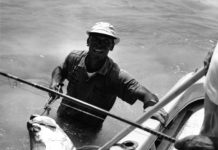SUNRIVER — Ten years ago, Jodi Wilmoth was captaining yachts and vintage boats in Alaska. Today she is at the forefront of conservation activities to support the Oregon spotted frog.
Wilmoth’s varied career — from naturalist to the pharmaceutical industry and now wildlife conservation — has landed her most recently in Sunriver, where she spends her summers trying to protect the threatened Oregon spotted frog by removing one of its major competitors: bullfrogs, which are not native to Oregon. The bullfrogs are taken by the thousands, and the project continues indefinitely.
Bullfrogs, also called American bullfrogs, were introduced to Oregon more than a century ago, and they have since proliferated. These frogs, which measure up to 8 inches across when full grown, come primarily from east of the Rockies and favor the southeastern part of the U.S. They were introduced to Oregon as a food item — their legs were once considered a delicacy.
Since their introduction to this state, a battle for supremacy has raged in Oregon’s frog habitats, and the bullfrog has largely outcompeted the native spotted frog. Bullfrogs take food resources away from the spotted frogs and occupy the prime living and breeding habitats. When confrontations occur, bullfrogs will eat the spotted frogs and can devour several dozen annually. They are also prolific breeders — a female can lay up to 20,000 eggs in one summer.
Bullfrogs are one reason why the Oregon spotted frog was listed as threatened under the Endangered Species Act in 2014.
The spotted frog, which measures 2 to 4 inches across, has other threats too, including habitat loss and environmental changes caused by dams and agriculture. More water is now released from Wickiup Dam in winter to help spotted frog populations, but reducing bullfrog populations in the Upper Deschutes River is an important task in helping to support the native frog species.
So Wilmoth and a team of volunteers catch bullfrogs, mostly at night.
“We go out at night because that is when we can see their bullfrog’s eyes shine in the headlamps. They are easy to spot,” she said. “Also when we have our headlamps on, they can’t see us, they can only see the light. So we can get very close to them.”
She hunts the frogs, using nets and her bare hands, in areas around Sunriver. In 2017 her control program captured more than 5,000 bullfrogs in Lake Aspen near the Sunriver Nature Center. The bullfrogs still are there, but rarely seen these days.
“We are giving the Oregon spotted frog a chance to get those resources, get that food and also have a major invasive predator removed,” said Wilmoth. “So hopefully we are going to see even better numbers of Oregon spotted frogs as we continue to keep the bullfrogs under control in those areas.”
She warns that recovery of the Oregon spotted frog is expected to take time and resources.
“Only with continued effort in invasive species control, protections and habitat conservation will we start to see the recovery of the Oregon spotted frog,” said Wilmoth. “We will need patience and time to see the results.”
Wilmoth also conducts bullfrog control programs at Vandevert Ranch and Thousand Trails Campground, both in the Upper Deschutes River basin. The Oregon Watershed and Enhancement Board, the Sunriver Homeowners Association and Sunriver Resort fund and support her efforts.
Wilmoth fell into bullfrog control, and Oregon spotted frog support, following a career that took her from Oregon and Washington to Alaska and back to Oregon. She grew up in Christmas Valley, studied molecular biology at Pacific Lutheran University in Washington, and then traveled to Alaska to work as a naturalist and fly fishing guide.
Along the way, Wilmoth earned a license to pilot large marine vessels of up to 200 tons. She drove yachts and other boats, including a vintage minesweeper from the 1940s, to shuttle tourists around Glacier Bay National Park.
After 10 years in Alaska, Wilmoth grew weary of seasonal work and moved back to the Pacific Northwest where she started a new career in the pharmaceutical industry doing project management and research. Her love of biology eventually led to volunteering for conservation projects — Portland-based Campbell Environmental hired her to work on the bullfrog control program in Sunriver.
The work allows Wilmoth to use the wilderness skills she perfected in Alaska, including kayaking, to reach bullfrog habitats. In the field, she removes bullfrog egg masses, traps tadpoles and captures the juvenile and adult bullfrogs. She keeps the frogs in Tupperware containers on her kayak before heading ashore.
The bullfrogs are put down with a chemical agent and then frozen. Some are given to researchers to dissect and the rest are put in a compost heap.
A year ago Wilmoth removed from Vandevert Ranch almost 50 egg masses, which contained around 1 million bullfrog eggs.
In 2018 she removed 14,000 bullfrog tadpoles from the Thousand Trails Campground area.
Wilmoth said the mission to keep the Upper Deschutes free of bullfrogs is ongoing, and she does not expect a full eradication from the area, as the amphibians will continue to arrive from upstream areas. But she is excited to teach children and adults about her program so as to keep the public aware that more work needs to be done.
Credit: Source link





























